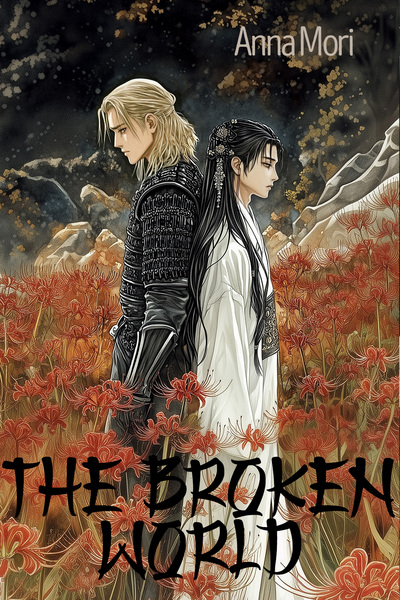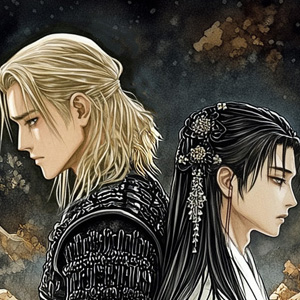"Does this conversation amuse you?"
"It delights me," Yukinari said sincerely. "To be honest, few dare to speak to me without a reason. I've been trying to change that, but... change takes time. Reforming the economy or the military is simple compared to altering people's habits."
"It seems most of the palace residents are afraid to even look you in the face."
"They are," Yukinari said. "And the rest dream of killing me."
He smiled his uncertain smile — that winter sunlight smile — but Gerel thought there was little humor in his words.
"A joke ought to be funny. That wasn't," Gerel remarked dryly.
The emperor shrugged.
"I hoped you might appreciate it. Those in power know better than anyone that court life only looks beautiful from the outside." His tone was light, but it was clear he wasn't pleased with the turn the conversation had taken.
True enough, court life in Cheongju was much the same — a viper's nest of intrigue and hatred. That was only natural; power was never won without struggle, and only the strong could hold it. Surely Yukinari wasn't complaining about his lot?
And so, Gerel said sharply, "That's the nature of power. Loneliness is the price you pay for it. Or are you trying to tell me you didn't want to be emperor?"
"I was the eldest — and now the only — son of my father. The throne isn't something you can refuse," Yukinari replied evasively. "All I can do is strive to be a worthy ruler so my reign isn't in vain."
"And if you had been given a choice?"
"I believe each person occupies the place the gods have assigned them," Yukinari said softly. Then, even quieter: "Though, in moments of weakness, I sometimes think I'd have preferred to be born a simple townsman."
Gerel couldn't suppress a laugh.
"I doubt you even remotely understand the life of ordinary people."
Yukinari fell silent for a moment, then, as if out of nowhere, asked:
"Have you ever had to carry heavy loads?"
"Sometimes," Gerel replied, puzzled. What was he trying to say?
"Imagine you have to move ten crates from one place to another. The first feels nearly impossible to lift. But after that first one, the second feels lighter — even though it weighs the same. You might even feel a strange satisfaction, as if the burden is becoming easier... But does that mean life should be an endless series of heavy burdens? Just because your life is less hard than someone else's, does that mean you should be content with it? I sometimes think people — all people — are meant for a different kind of life. A better life than they can even imagine..."
Gerel thought of his mother. She could have said something like that. No, not just could — she had. Often. Vividly, he remembered one of those moments: her pale blue eyes, so piercingly bright they almost seemed wholly azure, gazing not at him but through him, into a distant world only she could see.
"You know, Gerel," she had once said, "if people dream of things that don't exist in this world, maybe they were made for another one..."
He blinked, and the memory vanished.
"All right, fine," he admitted, "I suppose being an emperor isn't always fun."
The conversation left him feeling slightly unsettled. It was an odd exchange for two people who, just yesterday, hadn't even met. Gerel wasn't used to talking with anyone, let alone like this — with such candor.
Yukinari, too, seemed uneasy, silence stretching between them as though he regretted his brief lapse into sincerity. At last, he broke it, though not gracefully:
"General Gerel, do you play Mist and Clouds?"
"I do. I learned in Yuigui."
"Wonderful. There are few at court who enjoy the game. If you'd be willing to indulge me, we could continue the evening with a match — it's not yet too late. And the servants can bring us more tea..."
Naturally, Gerel agreed.
A servant brought the game box, and for a time, they played in silence. Gerel waited for the emperor to speak, but Yukinari seemed lost in thought. At length, Gerel decided to break the quiet.
"You know, this feels like one of those moments in old tales, where rulers discuss the fate of nations over a game of Mist and Clouds. At least, that's what always happens in novels."
Yukinari's voice, when he responded, lacked its usual warmth.
"There's nothing for us to discuss, as you well know."
"For instance," Gerel ventured cautiously, "I'm very curious about the upcoming negotiations."
The emperor shook his head.
"Come now. I agreed to receive your delegation for one reason only: to meet you face-to-face. To see what kind of man you are, General Gerel."
"Are you saying there's no hope for an alliance between our nations? It could bring great benefit to both."
"In your country, the word 'alliance' seems to mean something different than it does in mine," Yukinari replied with grim irony. "Shall I tell you how this will go? You'll open negotiations with a speech about peace and cooperation. I'll agree that peace is preferable to war, but I'll insist on terms equally beneficial to both sides. You'll refuse, because your emperor demands Ryukoku's total subjugation. I won't accept an alliance on those terms. Even if I were to yield — and I won't — the marriage proposal with your emperor's daughter is doomed. They say in Cheongju that your women are like eagles, their grip on a sword as firm as any man's. But my palace would be a cage for her. She would wither here — perhaps literally — and there would be nothing I could do to save her. Sooner or later, war would come regardless."
Yes, Gerel thought. He was right. It was only a matter of time. Even if the marriage succeeded, it would hardly stop Tokhung from going to war. The only question was whether it would happen now or years down the line.
Yukinari's voice remained calm, as though he spoke of something far removed from himself.
"When the appointed day comes, we'll discuss it all — at length, in more elegant terms, before countless ministers of both our courts. It will take all day, perhaps. But the result will not change. You and I both know this."
"And yet," Gerel pressed, "I sincerely hoped you might set aside your pride and accept peace on Tokhung's terms. Even a temporary peace." Seeing anger flash in Yukinari's eyes, Gerel quickly added, "Forgive me, Your Majesty. That was poorly phrased. But I want to avoid war. Surely you see it would be senseless slaughter. Your country has already endured a great war and is just beginning to recover. Your people are meant for peace, not conflict. When we met, I said your capital was beautiful, and I meant it. Shinju is a strange, melancholy, yet beautiful city. It would be a tragedy to see it reduced to rubble."
"Thank you for your honesty, General. It's refreshing when people speak their minds, even if their words are harsh. I don't want war with your country — or with anyone. My dreams lie elsewhere; destruction builds nothing worthwhile. But I cannot submit to your emperor, not out of pride but because such an alliance would bring nothing good to my people. Temporary peace, you say? Time is my enemy. A few years of such 'peace' would weaken my nation while yours grows stronger. But if war must come now..." Yukinari's lashes lowered, his smile faintly mocking. "What makes you so sure I will lose? I fully intend to win."
Beautiful, foolish, arrogant boy, Gerel thought irritably. Did he think he knew anything of war, sitting in this garden of red maples and golden carp, sipping tea from a delicate cup?
Yet, to Gerel's grudging acknowledgment, the emperor's reasoning was sound and sharp.
Yukinari moved a piece on the board. Until that moment, the game had seemed a stalemate, but with the sacrifice of a few pieces, he opened the upper field and suddenly gained a commanding position.
But Gerel was no novice. He knew and loved Mist and Clouds — a game where every piece had a clear purpose, where outcomes could be calculated with far greater certainty than in life. It was said that ancient generals used it to plan battle strategies before it became mere entertainment. In his youth, Gerel had spent countless hours studying the game, trying to grasp the minds of legendary commanders.
"If you've calculated everything, why haven't you tried to kill me?" Gerel asked quietly, half-wondering if the tea had been poisoned. But he felt perfectly fine.
"I could try," Yukinari replied just as softly, "but before my guards could act, you might shatter your cup and cut my throat with a shard."
He read my thoughts, Gerel realized. Yukinari had only three bodyguards, and two of them were too far away. A leap to the left, a strike to the nearest guard, the shattering of the cup — Gerel might even reach the sword lying nearby before they cut him down.
"Then you shouldn't have offered me tea," Gerel said with a faint smile.
Yukinari smiled back, a genuine, warm expression despite the tension.
"I hope I'm still free to serve tea in my own palace without fearing the consequences."
Perhaps he was offering a temporary truce.
"Why haven't you considered the third force that might sway the war's outcome?" Gerel asked, meaning Yuigui.
An audacious question — but after discussing murder-by-cup, what did it matter? Besides, Yukinari clearly understood the balance of power in the Middle Kingdoms.
"I'd be surprised if Yuigui interfered. They have no reason to help either side. War will weaken both Cheongju and Ryukoku, which suits Yuigui perfectly."
Gerel was taken aback by his adversary's clear-eyed pragmatism, but he returned his focus to the game.
A few moves later, he spotted a tiny flaw in Yukinari's strategy — something only a master would notice. Gerel reached for a piece to exploit it but hesitated. Would it be appropriate to defeat an emperor? And if this match was a test of their strategic abilities (which it clearly was), it might be wiser to let his opponent underestimate him. In real battle, such an advantage could prove decisive.
Instead, he made a different move, leading to an exchange of pieces that left the board nearly barren. Neither player could achieve victory.
A draw.
Yukinari smiled, and something in his expression told Gerel he had noticed the hesitation — and that the earlier flaw had been deliberate, a test.
"You let me win."
"And you refrained from exploiting your own advantage," Gerel countered.
"I'd like to play again, on the condition that you play honestly."
"I could promise that," Yukinari said, "but would you believe me?"
(Days, weeks, months later, Gerel would replay this conversation in his mind, realizing it wasn't only about Mist and Clouds. But neither of them could have known that then.)
"I'll try to believe you."
Within a few moves, Yukinari remarked, "You'll lose in twelve moves — or twenty, if you sacrifice several pieces."
It sounded like empty boasting, but to Gerel's surprise, the prediction held true. Eight moves later, he realized victory was out of reach; the count was exact.
"You see? I was honest." Yukinari smiled.
"Am I really that poor a player?" Gerel asked, annoyed.
"You're the best I've ever faced," Yukinari replied. "But I've seen this scenario before. I'm no genius — just someone with a good memory and far too much practice as a child. More than was healthy, perhaps..." His words trailed into ambiguity.
They played again. This time, Gerel focused intensely and won, hoping the victory was genuine. In the following match, Yukinari triumphed — or simply stopped holding back. With such an enigmatic opponent, certainty was impossible. His skill was dazzling, as though he envisioned countless outcomes from the very first move. Gerel hadn't enjoyed a game this much in years. Perhaps ever.
After their fourth match, Gerel realized they'd been playing for hours. Surely the emperor had more pressing matters but was too polite to dismiss him outright.
"I've lost track of time, and I must be keeping you from your duties. I've greatly enjoyed this, Your Majesty, but I think we should stop here."
Yukinari nodded.
"You're right, General Gerel. Forgive me; I do need to attend to other matters..."
The regret in his voice was genuine. He clearly lacked worthy opponents, and Gerel found himself pleased to have provided him with some measure of enjoyment.











Comments (0)
See all